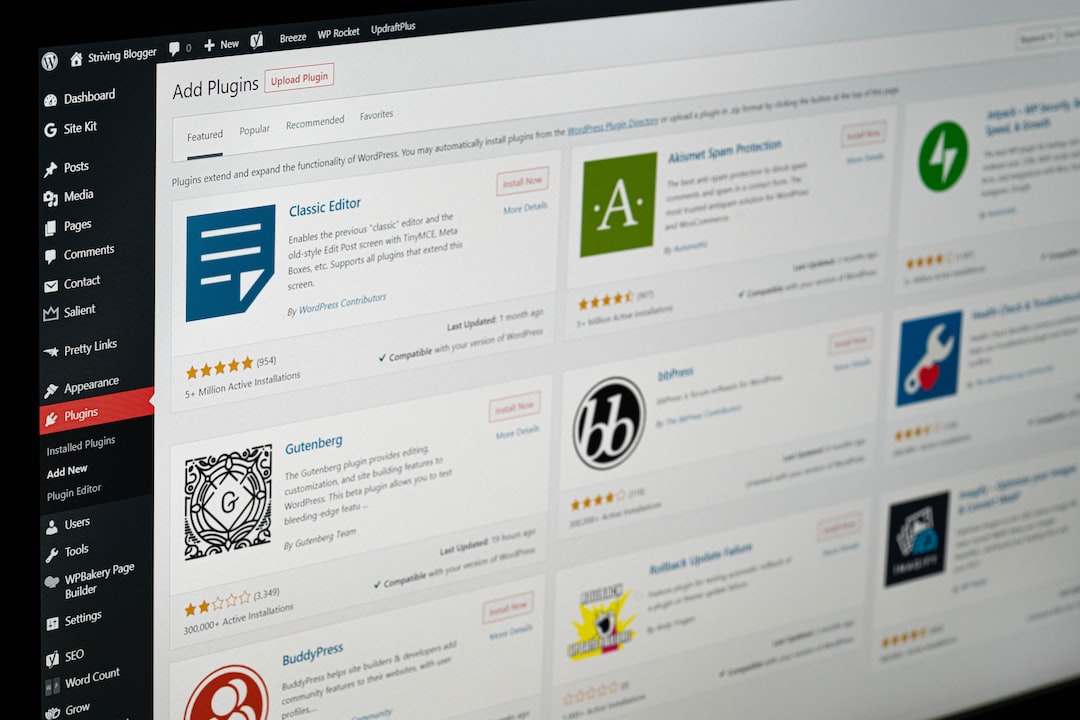What are Website Plugins?
Web plugins are pieces of software that allow webmasters to add extra features or functionality to your websites. This can include things like adding new forms or menus, tracking user activity, and even displaying customised content based on the visitor’s IP address or other demographic information.
What are Web or Website Plugins?
Plugin developers typically offer a range of different plug-ins, with some designed specifically for use with WordPress websites, while others work with a wider range of platforms. Some popular plugin types include social media plugins (for example, enabling users to share content on Facebook or Twitter), search engine optimization (SEO) plugins, and website security plugins.
Plugins can be very useful additions to a website, providing extra functionality and enhancing the user experience. They’re also an affordable way to add extra value to your business – many plugin developers offer free versions of their products as well as premium versions that come with additional features and support. So whether you’re looking for ways to enhance your website’s user experience or want to add extra value for your customers,plugins are a great way to go.
Why Website Plugins Matter?
Website plugins are a great way to give your website a boost in terms of functionality and design. They can offer features such as social media integration, enhanced search engine optimization, and even email marketing capabilities. In addition, they can give your website an overall more professional look and feel. Some of the most popular website plugins include: Google Analytics, Yoast SEO WordPress Plugin, and Gravity Forms.
How Does Website Plugins Work?
Website plugins use a plugin hosting service to store and manage the plugin files. When a user visits a website that has plugins enabled, the plugins are loaded from the host service and executed. This process can be automated using a plugin automation tool.
Plugin hosts offer different features, including version control, automatic updates, and access to customer support. Some hosts also provide hosting for premium plugins that may have additional features or require more resources than regular plugins.

Type of Plugins
Here are some of the most popular plugins being used on websites nowadays.
Backup Plugins
Backup plugins are applications or scripts that are used to back up files and folders on a computer. They can be used to create backups of entire computers, specific files or folders, or a combination of both. Backup plugins can be stand-alone applications or they can be included as part of an existing application.
Web Security Plugins
Web security plugins are programs that help protect a website from being accessed by unauthorized individuals. They can be used to prevent malware from being installed on a website, to prevent users from sneaking past security measures, and to block spam emails. Many of the most popular web security plugins are offered as free downloads by reputable websites.
Contact Form Plugins
Contact form plugins are a great way to quickly add contact forms to your website. They allow you to easily collect contact information from your visitors, and then send them an email or message based on their input. Contact form plugins can be used for a variety of purposes, such as collecting leads from visitors, gathering feedback from customers, or managing customer service inquiries.
Social Sharing Plugins
Social sharing plugins are add-ons that allow users to share web content on social networks like Facebook and Twitter. They typically include buttons that allow users to post the content on their personal Facebook or Twitter accounts, as well as a link back to the original page or article. Social sharing plugins can also display statistics about how often the content has been shared, helping site owners track which pieces of content are most popular.
Page Builder Plugins
Page Builder plugins are a type of web plugin that lets you create dynamic and personalized pages on your website. They give you the ability to add custom elements, such as header, footer, sidebar, and content blocks, to your pages without having to write any code. This makes them a great choice if you want to quickly build a custom page without having to spend hours coding. Additionally, page builder plugins can help you manage your content more easily by automatically adding new posts or pages to your blog or website as you publish new content.

Live Chat & Chatbots
Live Chat is a type of online communication where two or more people are connected in real time and can communicate through chat windows. Chatbots are computer programs that simulate human conversation.
Ecommerce Plugins
Ecommerce plugins are often installed on a website in order to enhance the shopping experience for site visitors. These plugins can include features like product search, product sorting, and user reviews. They can also help to automate certain processes, such as shipping and billing. Ecommerce plugins can be helpful for both small businesses and larger retailers.
Booking Plugins
Booking plugins are a type of web plugin that allow website owners to add features to their websites that enable them to manage bookings more easily. These plugins can include features such as the ability to process bookings, send confirmation emails, and keep track of customer account information. Some booking plugins also offer features that allow website owners to generate customised booking forms, manage reservations in bulk, and more.
Payment Plugins
payment plugins are software that allow businesses to accept payments online. This can include things like PayPal, Stripe, and Square. They can be used for a variety of purposes, such as processing transactions, collecting payments, and providing customer support. They’re often free to use and easy to set up.
SEO Plugins
Search engine optimization (SEO) is the practice of improving the ranking of a website on search engines. The main goal of SEO is to improve the visibility and ranking of a website within the search engine results pages (SERPs), thereby increasing traffic and yielding better conversion rates.
In order to achieve higher rankings, websites must be optimized for various search engines including Google, Yahoo! Search, Bing, AOL Search, and Ask.com. There are many different types of SEO plugins that can be used to improve a website’s ranking: content optimization, link building/mapping, on-page SEO techniques such as keyword research and active link building/optimization, social media integration/management and Panda/ Penguin update management.
Other Plugins For Website
- WPForms
- MonsterInsights
- All in One SEO
- Constant Contact
- OptinMonster
- SeedProd
- MemberPress
- UpdraftPlus
- WP Rocket
- Sucuri
- PushEngage
- RafflePress
- Uncanny Automator
- SearchWP
- Google Workspace
Free vs Paid Plugins
There are a few important things to keep in mind when considering whether to use free or paid plugins for your website. Paid plugins typically offer more features and support, and can be more reliable. However, free plugins can also be a good option if you don’t need all the bells and whistles offered by paid plugins, or if you plan on using the plugin only occasionally. Ultimately, it’s important to decide what features are most important to you and which plugin will meet those needs.
READ ALSO: 50 Free WP Plugins and Paid WP Plugins







